During 2023, we conducted a micro-survey among DevOps & SRE engineers dedicated to their job satisfaction. The idea behind it was to reveal the significant factors impacting engineers’ contentment of what they do and where they work.
We verified the results with the DevOps team leads in Palark, who confirmed the relevance of our takeaways with their own experience:
The formal results of this survey didn’t seem to be a great discovery for me. They turned out to be additional evidence of what I personally feel about working in IT operations and what I see in most engineers around me. I hope reading this report will help companies lacking DevOps & SRE among their core competencies to understand such engineers, their expectations, worries, and struggles much better. Eventually, this understanding might make both sides happier.
Ilia Andreev, DevOps team lead @ Palark
We also sent the resulting report to our respondents who expressed such interest and got positive feedback from them. Now, we’re happy to share our DevOps & SRE job satisfaction survey insights with a broader community in the blog.
Top motivators for DevOps & SRE engineers
Engineers are big enthusiasts of what they are doing. Hence, Learning & trying bleeding-edge technologies is the most enjoyable part of their jobs. This answer to the “What do you like most about your work?” question was supported by 77% of our respondents in general.
It became even a bigger winner if engineers with less experience (< 5 years) only were considered, demonstrating an 85% endorsement. While it had only 64% of more experienced engineers’ votes, it still topped their motivators list.
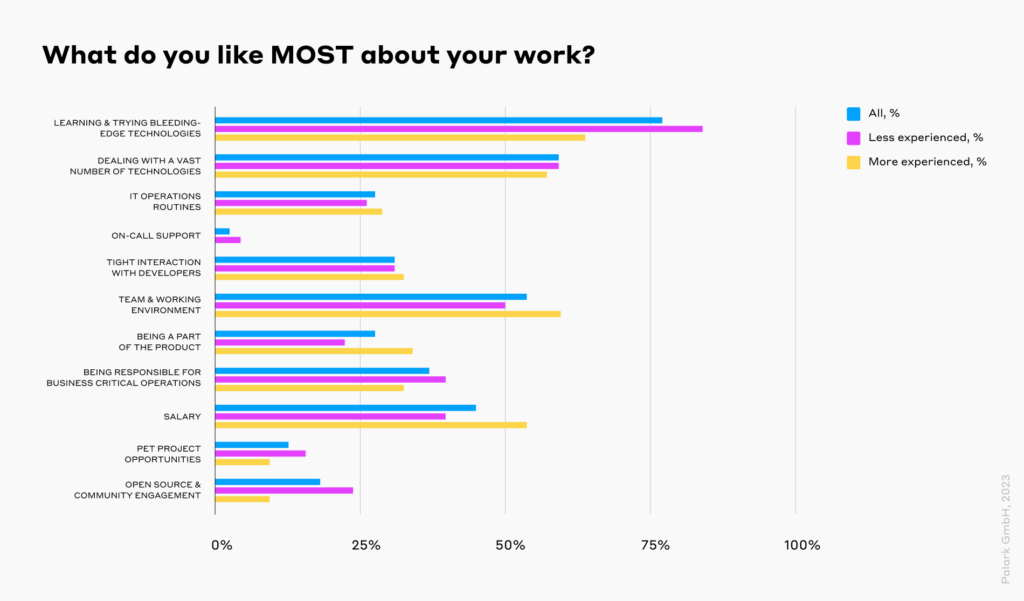
Two other options that got more than 50% support from respondents were Dealing with a vast number of technologies (59%) and Team & working environment (54%):
- The former reassures us of the technological enthusiasm again, shifting our focus to an impressive variety of existing tools, a strong desire of engineers to try many of them and to have a broad perspective on this ever-changing tech landscape. (And there’s absolutely no need to insert another meme about the endless CNCF Landscape here, right?)
- The latter goes behind technologies and anticipates the importance of an established culture in the company. Many things have been said on this matter in the industry, but I’d like to refer to the SRE Report 2023 by Catchpoint as a vivid illustration of how your culture impacts team performance.
Be it a surprise or not, other options directly related to technology enthusiasm — namely, Open Source & community engagement and Pet project opportunities — are not among the significant motivators for engineers. They were chosen by only 18% and 12% of respondents, correspondingly. It’s also essential to note that less experienced engineers appreciate such opportunities 2-3 times more than more experienced ones.
How salary affects job satisfaction
Salary became the closest runner-up for the Top 3 motivators and demonstrated a solid group of 47% of respondents, calling it one of the things they like most in their work. At the same time, the salary was named the #3 disappointing factor among our respondents. However, it was called so by only 18% of survey participants, which does not seem to be a big deal when we look at the whole picture.
To understand this contradiction better, we should realise that the DevOps & SRE engineers’ satisfaction level with the salary increases as their experience increases. Here’s the difference we acknowledged in our survey results:
| Engineers’ experience | <5 years | >5 years |
| Like salary most | 41% | 56% |
| Like salary least | 22% | 11% |
We attribute this gap to two different causes:
- More experienced engineers are offered better salaries.
- Staying longer at similar positions (without changing jobs) means the person is more likely to be satisfied with their salary level anyway.
To summarise, salary is crucial in making engineers happy (isn’t that relevant for all others as well, though?), and most engineers consider their salary a strong point of their profession.
What engineers don’t like
On-call support is an absolute winner in what DevOps & SRE engineers like the least, as answered by convincing 58% of respondents.
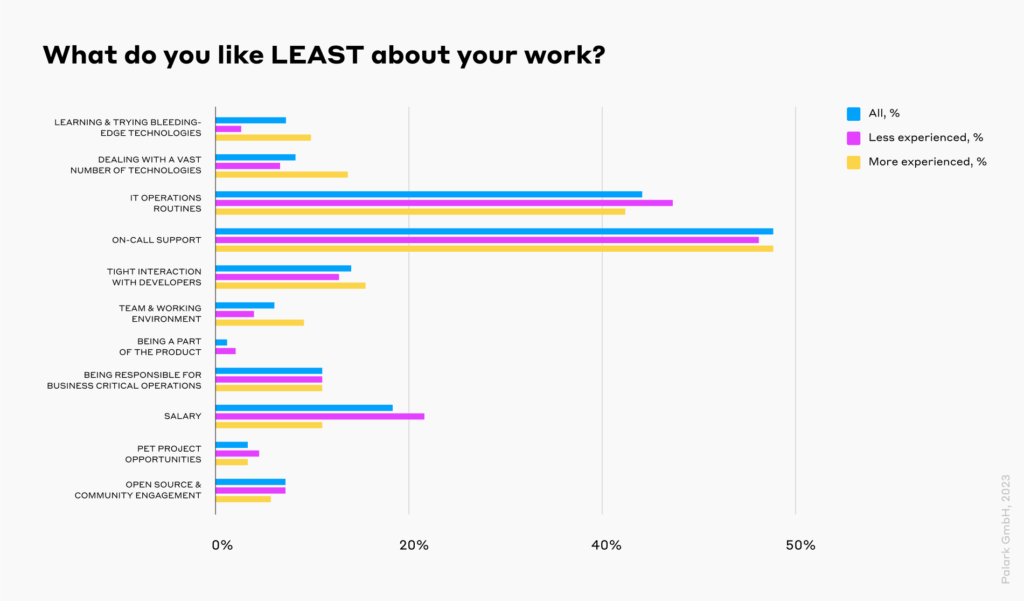
Additionally, it’s helpful to recall our previous chart with the most liked things by engineers. There, we can see undisputable support for the statement above: literally nobody — well, a negligible 2% — likes on-call support.
Based on these results, we can expect a significant advantage for engineering positions involving no on-call support responsibility. In case it’s something you can’t avoid, implementing an appropriate on-call culture — e.g., such as suggested by PagerDuty — becomes a must for your organisation.
Engineers seeing on-call support as the least pleasant part of their job can count me in! However, there are interesting implications to be aware of. If we want our on-call shifts to be less stressful, we must render our other tasks responsibly and diligently. We need to follow the established best practices and provide all necessary documentation. By doing so, we can minimise the number of incidents for our on-call companions and substantially simplify handling the rest of them.
Renat Khamadiev, DevOps team lead @ Palark
Another prominent demotivator for DevOps & SRE engineers is IT operations routines, as expressed by 44%. This might be considered another acknowledgement of engineers being enthusiastic about their work: they aspire to automate as many routines as possible and have more time for new, exciting tasks and technologies.
Interestingly, the same routines are something quite many engineers (27%) like the most. This fact partly compensates for the abovementioned negative attitude and pictures IT operations routines as a more or less tolerable part of the engineers’ work.
All other answers lag behind vastly and, thus, don’t seem to be a show-stopper for most engineers.
Two other factors contributing to job satisfaction
I’d like to mention two more correlations delivered to us by this survey. They shed more light on what else helps to keep DevOps & SRE engineers motivated.
Firstly, we presume that engineers’ level of satisfaction with the current DevOps practices in their organisation directly impacts their overall job satisfaction — simply because these practices shape the way the engineers work every day. Hence, we decided to see which factors are the most important in satisfying respondents with existing DevOps practices. We found two of them:
- Satisfaction level directly correlates with how well an engineer understands the organisation’s business objectives.
- Bigger SRE/DevOps teams are more satisfied with their DevOps practices. We assume that: a) it’s hard to establish DevOps practices while working in IT operations alone, and b) you can’t scale well enough without elaborating on and following various guidelines and best practices.
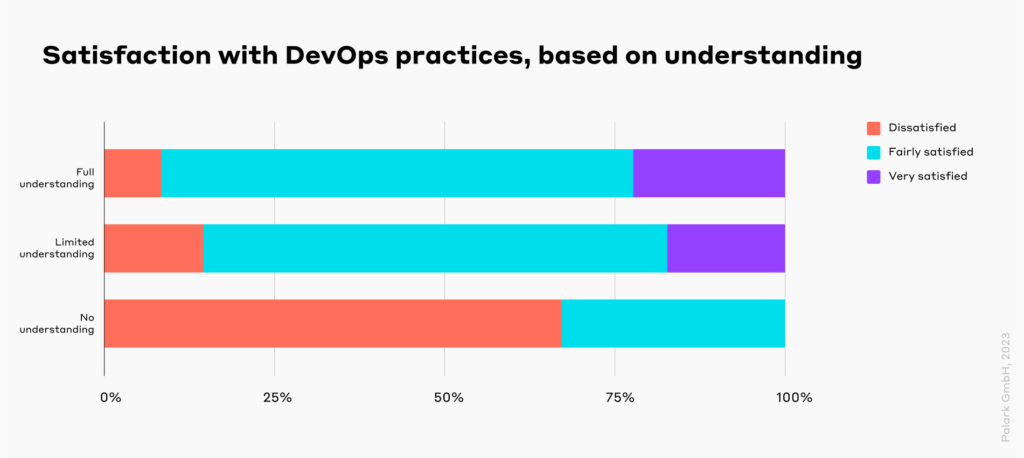
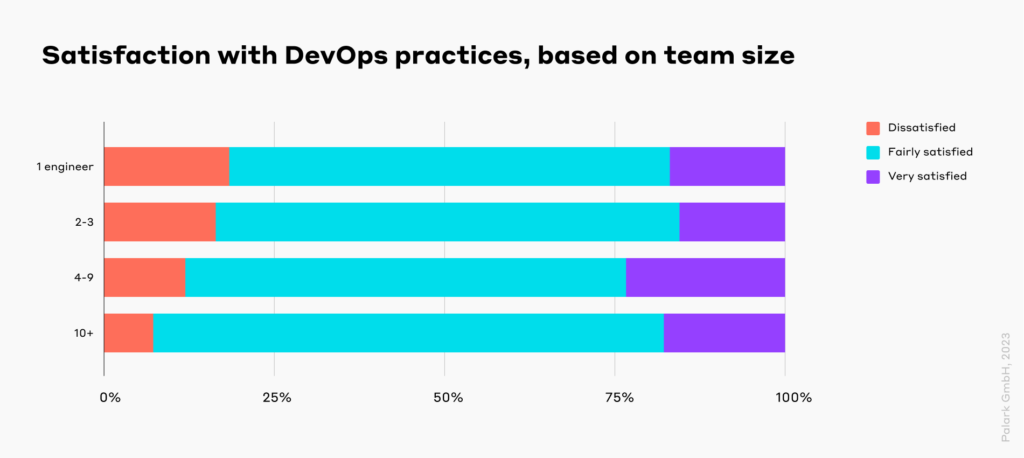
Another correlation we found is related to the type of companies where engineers work. Being employed by the companies that provide DevOps & SRE services might be beneficial because:
- These companies demonstrated the largest share of respondents who’ve worked for their current employer for 5+ years (15%).
- They have the biggest share of the most experienced engineers: 25% of respondents working for such companies have 10+ years of experience in DevOps.
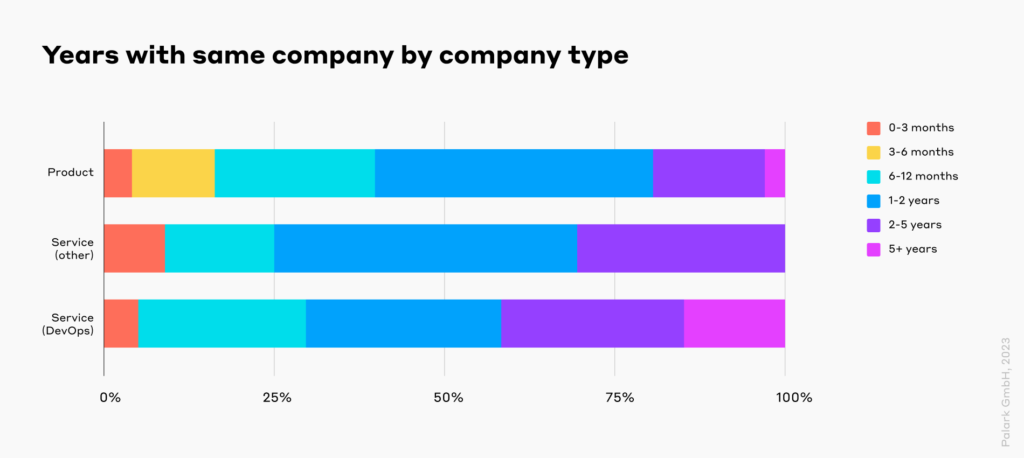
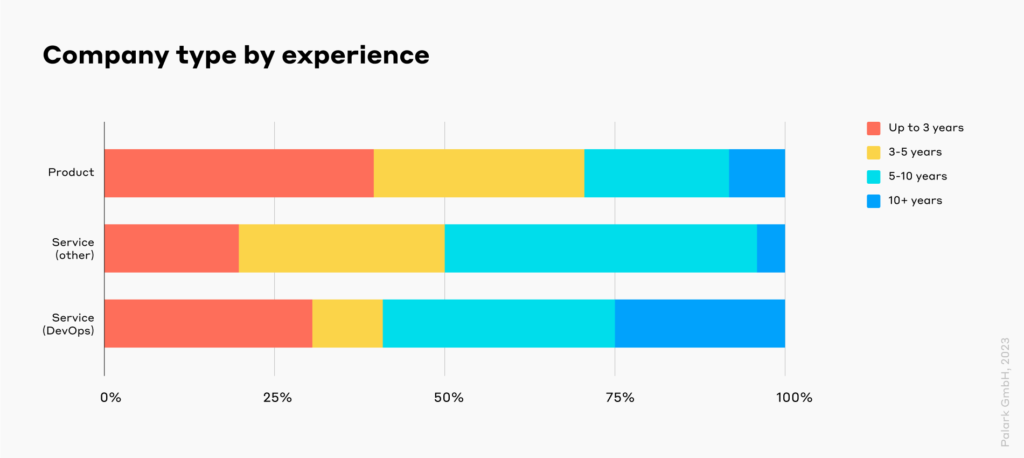
As we know precisely in Palark, DevOps & SRE service providers often come with great opportunities in terms of dealing with new and various technologies. As we saw earlier, these opportunities are the best motivators for such engineers.
On the other hand, working in these companies also likely involves so much hated on-call support. Based on our experience, we can assume that such providers do their best to lessen the burden and implement SRE necessity in the best possible way.
Takeaways
Based on the results of this survey, here’s our formula for happy DevOps & SRE engineers:
- Let them learn & try bleeding-edge technologies and deal with a vast number of them. (There’s nothing like this in production? Some research & experiments might be performed then.)
- Ensure a friendly team & working environment by cultivating an appropriate culture.
- Pay a reasonable salary.
- Try to minimise the on-call support duties. (If that’s not feasible, help your engineers by all means! At least introduce comprehensive onboarding, take care of documentation, and establish a supportive environment.)
- Ensure that engineers understand the business objectives.
Finally, If you’re a company providing DevOps & SRE services, you might be luckier in having more motivated and experienced engineers. Obviously, it is not guaranteed in any way — it’s just a fantastic opportunity not to be missed!
P.S.
This survey took place from April to August 2023 and was completed by 90 DevOps and SRE engineers. We want to thank all of them for their participation! After compiling all these results, we are pretty sure: it was worth it!
You can also find a more detailed report based on this survey in the PDF format here.



Comments